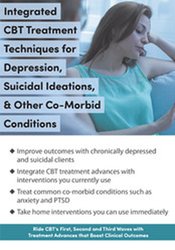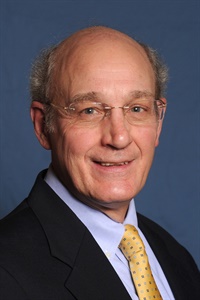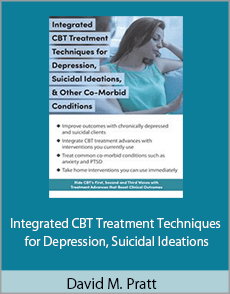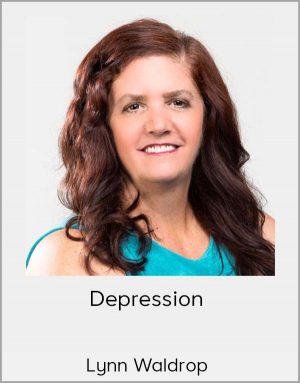David M. Pratt – Integrated CBT Treatment Techniques for Depression, Suicidal Ideations, Other Co
$45.00$219.99 (-80%)
He will help you integrate “Third Wave” CBT Therapies such as Mindfulness-Based Cognitive Therapy (MBCT) and Acceptance and Commitment Therapy (ACT) with “First and Second Wave”
David M. Pratt – Integrated CBT Treatment Techniques for Depression, Suicidal Ideations, Other Co

Check it out: David M. Pratt – Integrated CBT Treatment Techniques for Depression, Suicidal Ideations, Other Co
Description
Enhance Your Skills and Improve Outcomes with Depressed and Suicidal Clients
The ongoing treatment of the depressed and suicidal client is an enormous clinical challenge. Clinicians often state that they feel well-trained in assessing and intervening when their clients initially have suicidal ideations, but feel at a loss when the client returns for treatment, still depressed, and possibly still suicidal.
Dr. David Pratt has worked with this challenging population for over 35 years and brings his expertise to share practical CBT techniques for clinicians to use with their depressed and suicidal clients. He will help you integrate “Third Wave” CBT Therapies such as Mindfulness-Based Cognitive Therapy (MBCT) and Acceptance and Commitment Therapy (ACT) with “First and Second Wave” CBT therapies you may already be using. In addition, he will share practical interventions you can use for on-going depression and suicidal ideation, as well as evidence-based treatments for other common co-morbid conditions such as anxiety disorders and PTSD.
Handouts
Manual – Integrated CBT Treatment Techniques (4.05 MB) 226 Pages Available after Purchase
Outline
“FIRST AND SECOND WAVE” APPROACHES
- Foundations of CBT
- “First Wave” therapies
- “Second Wave” therapies
“FIRST AND SECOND WAVE” CBT TECHNIQUES FOR THE DEPRESSED AND SUICIDAL CLIENT
- Education: The CBT Model and depression
- Mood Monitoring: Developing self-awareness
- Behavioral Activation: Getting active again
- Cognitive Restructuring: Healthy thinking
- Problem Solving: Overcoming “Learned Helplessness”
- Social Skills Training: Essential social skills for relationship development
- Wellness and Depression: Developing a healthy life style to overcome depression
- Using CBT Skills for suicide prevention and safety planning
“THIRD WAVE” ADVANCES IN CBT FOR THE TREATMENT OF DEPRESSION AND SUICIDE PREVENTION
- Mindfulness-Based Cognitive Therapy (MBCT): Mindfulness vs. Meditation
- Teaching Mindfulness Skills: Multi-sensory applications
- Acceptance and Commitment Therapy (ACT): The dialectic of acceptance vs. change
- Mindfulness self-monitoring: Enhanced self-awareness
- Mindfulness and Acceptance: Developing tolerance for distressful experiences
- Acceptance vs. Change: Identifying and committing to personal values
EVIDENCE-BASED TREATMENTS FOR COMMON CO-MORBID CONDITIONS
- Anxiety Disorders and Exposure Therapy
- PTSD and “Prolonged Exposure”
INTEGRATING TREATMENT OF DEPRESSION AND CO-MORBID CONDITIONS WITH THE COMPLICATED CLIENT
- Evaluation and case conceptualization
- Prioritizing treatment
- Treatment phases and juxtaposing interventions
- Enhanced skills-based suicide prevention and safety planning
Faculty

David M. Pratt, Ph.D., MSW
Western New York Psychotherapy Services
David M. Pratt, Ph.D., MSW, is in private practice and Director of the Mood Management Program at the Western New York Psychotherapy Services in Amherst, NY. He is presently on faculty with the University at Buffalo, School of Social Work, Office of Continuing Education, and a member of New York State, Office of Mental Health Advisory Board on Evidence-Based Treatments for Youth. He was the Principal Psychologist at the Western New York Children’s Psychiatric Center, Clinical Assistant Professor of Psychiatry at the University at Buffalo and Adjunct Professor/Lecturer, University at Buffalo Counseling, School and Educational Psychology department.
Dr. Pratt has conducted numerous trainings/workshops in Cognitive Behavioral Therapy at local, state, national, and international forums. He is well regarded as an engaging trainer who emphasizes practical skill development.
Speaker Disclosures:
Financial: David Pratt is in private practice. He receives a speaking honorarium from PESI, Inc.
Non-financial: David Pratt has no relevant non-financial relationship to disclose.















